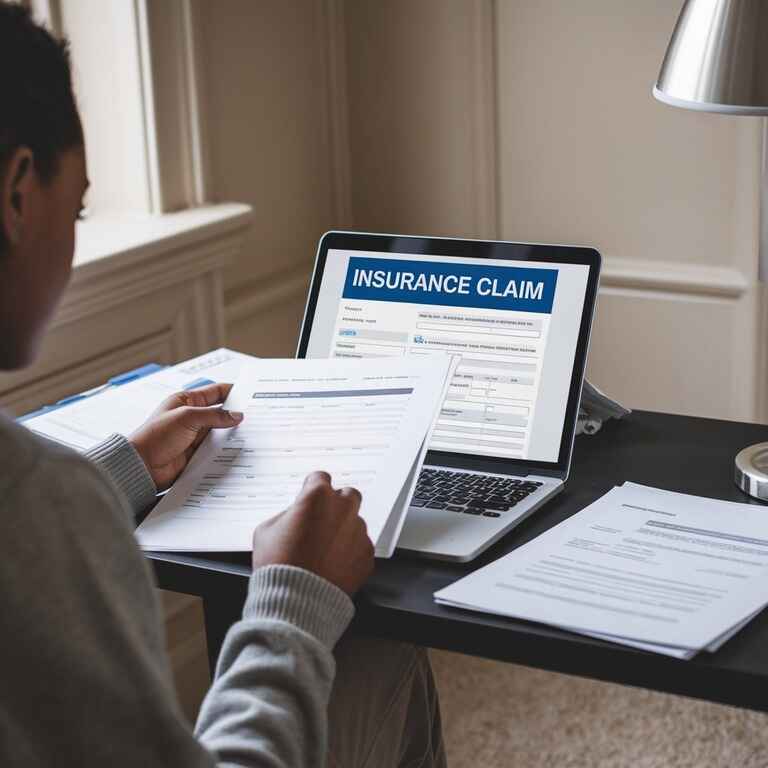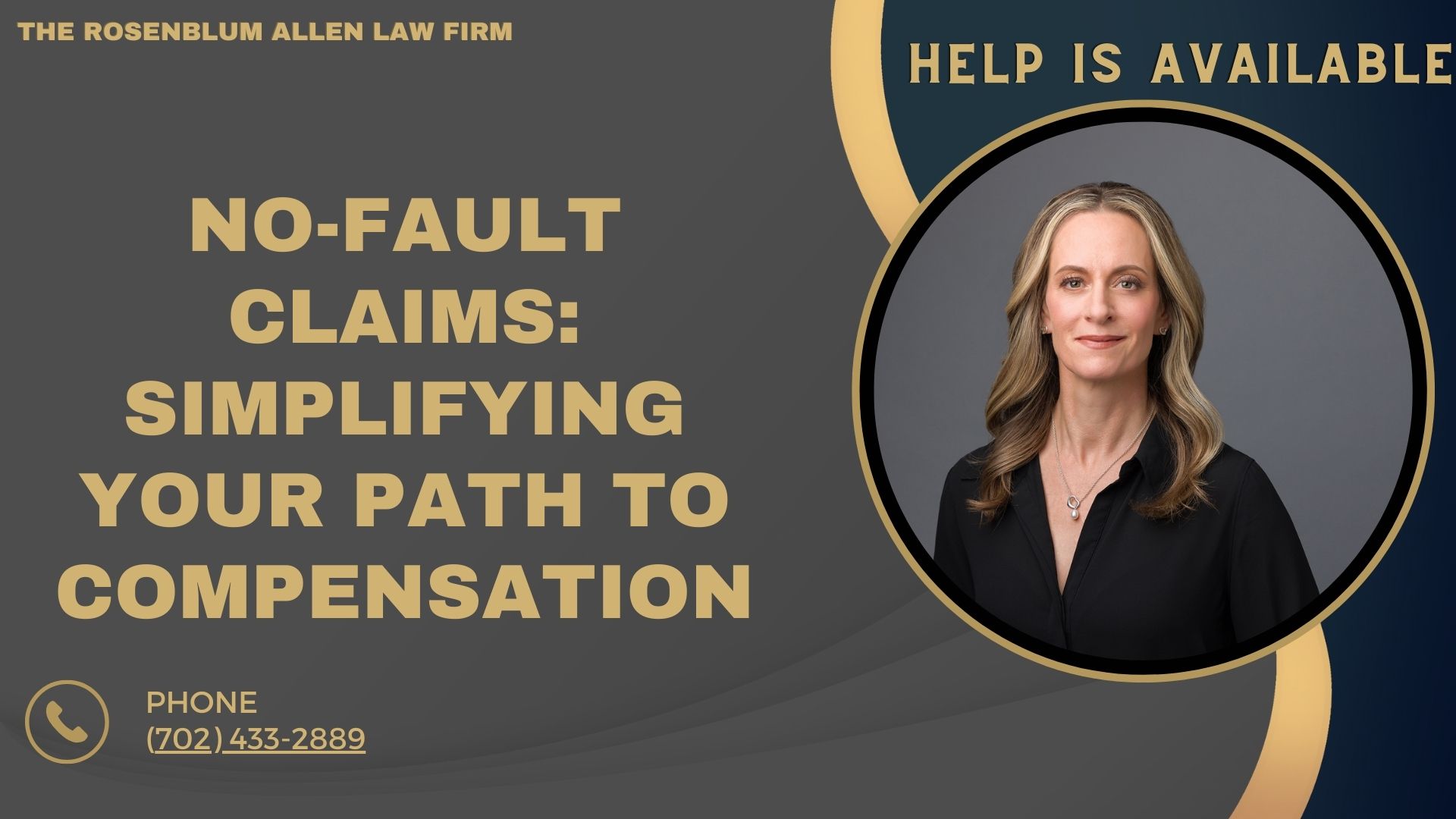When accidents happen, dealing with insurance claims can be confusing. Understanding no-fault claims is essential for anyone navigating an insurance process, especially in Nevada, where at-fault laws primarily govern personal injury and auto insurance cases. This guide explains no-fault claims, how they work, and what to expect when filing one.
 What Are No-Fault Claims?
What Are No-Fault Claims?
Definition and Purpose
A no-fault claim allows an individual to receive compensation for medical bills and lost wages from their insurance provider, regardless of who caused the accident. This system is designed to reduce legal disputes and speed up compensation.
Common Types of No-Fault Claims
No-fault claims typically apply in the following scenarios:
- Auto Accidents – In states with no-fault insurance laws, drivers file claims with their own insurers.
- Workers’ Compensation – Employees injured on the job receive benefits without proving employer negligence.
- Personal Injury Protection (PIP) Claims – Covers medical expenses and lost income, often part of auto insurance policies.
How No-Fault Insurance Works
| Feature | No-Fault Insurance | At-Fault Insurance |
|---|---|---|
| Who Pays? | Your own insurance covers medical bills. | The at-fault party’s insurance pays. |
| Lawsuits Allowed? | Limited; only in severe injury cases. | More common to recover full damages. |
| Claim Processing | Faster, since fault does not need to be proven. | Slower due to investigations and disputes. |
| Coverage Limits | Typically covers only medical bills and wages. | Can cover medical, property damage, and pain and suffering. |
How No-Fault Claims Work in Nevada
Nevada’s Stance on No-Fault vs. At-Fault Systems
Unlike some states that operate under a no-fault auto insurance system, Nevada follows an at-fault system for auto accidents. This means:
- The driver responsible for the accident must cover damages through their liability insurance.
- Injured parties can seek compensation from the at-fault party’s insurer or file a lawsuit if necessary.
- No-fault claims are primarily seen in workers’ compensation or PIP policies rather than standard auto insurance.
Key Legal Statutes Governing No-Fault Claims in Nevada
Nevada’s insurance and personal injury laws include:
- Nevada Revised Statutes (NRS) Chapter 687B – Governs auto insurance policies.
- NRS Chapter 616A-616D – Covers workers’ compensation laws.
- Personal Injury Protection (PIP) Coverage – Optional but provides no-fault benefits.
Who is Eligible to File a No-Fault Claim in Nevada?
In Nevada, individuals may file a no-fault claim if they:
- Have Personal Injury Protection (PIP) coverage under their auto policy.
- Were injured at work and qualify for workers’ compensation benefits.
- Have medical payment coverage (MedPay) as part of their auto insurance policy.

Benefits and Limitations of No-Fault Claims
Advantages of Filing a No-Fault Claim
No-fault claims can be a lifesaver when you need quick compensation. Instead of waiting for insurance companies to argue over who’s at fault, you get financial help immediately. Here’s why they can be beneficial:
- Faster Compensation – Since fault doesn’t have to be determined, claims are processed much faster.
- Less Stress – No drawn-out court battles or back-and-forth disputes with the other party.
- Guaranteed Coverage – Even if you caused the accident, your insurance covers medical bills and lost wages.
- Lower Legal Costs – No-fault claims reduce the need for lawsuits, which can be expensive and time-consuming.
Limitations and Restrictions
While no-fault claims have benefits, they also come with strict limits:
- Limited Compensation – No-fault policies usually cover medical bills and lost wages, but not pain and suffering.
- Coverage Caps – Insurance companies have limits on how much they will pay. If your expenses exceed those limits, you may have to pay out of pocket.
- No Coverage for Property Damage – If your car is damaged in an accident, a no-fault claim won’t cover repairs. You’d need to file a separate claim for property damage.
- Not Always Available – In Nevada, standard auto insurance does not include no-fault coverage unless you have PIP or MedPay.
Here’s a quick comparison:
| Benefit/Limit | No-Fault Insurance Covers? | At-Fault Insurance Covers? |
|---|---|---|
| Medical Bills | ✅ Yes | ✅ Yes |
| Lost Wages | ✅ Yes | ✅ Yes |
| Pain and Suffering | ❌ No | ✅ Yes |
| Property Damage | ❌ No | ✅ Yes |
| Faster Payout | ✅ Yes | ❌ No (can take longer) |
Differences Between No-Fault and At-Fault Claims
Key Distinctions in Liability
The biggest difference between no-fault and at-fault claims is who pays for what. In a no-fault system, your own insurance covers you, regardless of who caused the accident. In an at-fault system, the responsible party’s insurance pays.
Think of it this way:
- No-Fault = “It doesn’t matter who caused it, my insurance will cover me.”
- At-Fault = “If I’m not responsible, I can make the other party pay for everything.”
Impact on Compensation and Legal Proceedings
| Factor | No-Fault System | At-Fault System |
|---|---|---|
| Who Pays? | Your own insurer | The at-fault driver’s insurer |
| Can You Sue? | Only for severe injuries | Yes, you can sue for full damages |
| Claim Speed | Fast (no fault determination needed) | Slow (requires fault investigation) |
| Pain & Suffering? | Not covered | Covered |
When an At-Fault Claim Might Be Necessary
Even if you have no-fault coverage, sometimes an at-fault claim is better. Here’s when you might need to go the at-fault route:
- Serious Injuries – If your medical costs exceed your no-fault insurance covers, you may need to file a lawsuit.
- Property Damage – No-fault claims don’t cover vehicle damage, so you must go after the at-fault driver’s insurance.
- Permanent Disabilities – If the accident leaves you with long-term injuries, you may be eligible for additional compensation through an at-fault claim.

Steps to File a No-Fault Claim in Nevada
Filing a no-fault claim doesn’t have to be complicated, but missing a step could slow things down. Here’s what you must do to ensure your claim is processed quickly and smoothly.
Gathering Required Documentation
Before filing, make sure you have all the necessary paperwork. This helps avoid delays or denials. Here’s what you’ll need:
- Accident Report – If it’s a car accident, get a copy of the police report. For workplace injuries, get an incident report from your employer.
- Medical Records – Keep all bills, prescriptions, and doctor’s notes about your injury.
- Proof of Lost Wages – If you missed work, gather pay stubs and a note from your employer.
- Insurance Policy Information – Ensure you understand what your policy covers before filing a claim.
Reporting the Incident
Timing matters when it comes to no-fault claims. Most insurance policies have strict deadlines, so don’t wait too long to file.
- For auto accidents: Report the claim to your insurance company as soon as possible, ideally within 24-48 hours.
- For workplace injuries: Notify your employer immediately and file a workers’ compensation claim.
Working with Insurance Providers
Once your claim is filed, your insurance company will investigate. They may:
- Request additional documents.
- Ask you to see an approved doctor for evaluation.
- Offer a settlement based on your policy limits.
If everything checks out, you should receive compensation within a few weeks. If they push back, don’t worry—we’ll cover what to do next.
Potential Challenges and How to Overcome Them
Even with the best preparation, issues can still pop up. Here’s how to handle common problems:
| Problem | Solution |
|---|---|
| Claim Denied | Request a written reason, provide missing info, or appeal. |
| Not Enough Coverage | Check for other benefits (MedPay, workers’ comp, health insurance). |
| Delays in Processing | Follow up regularly, document every call/email. |
| Insurance Disputes | Seek legal advice if the insurer is acting in bad faith. |
Common Issues and Disputes in No-Fault Claims
Even when you do everything right, insurance companies sometimes drag their feet or refuse to pay. Here’s how to tackle the most frequent no-fault claim issues.
Denied Claims and Reasons Why
A claim denial doesn’t mean the end of the road. First, figure out why it was denied. The most common reasons include:
- Missed Deadline – You waited too long to file.
- Insufficient Documentation – Something like medical records or proof of lost wages are missing.
- Pre-Existing Condition – The insurer claims your injury existed before the accident.
- Policy Exclusions – Your policy doesn’t cover specific injuries or situations.
What to Do If Your Claim Is Denied
- Get the denial in writing. This helps you understand the issue.
- Submit missing documents. If they need more proof, send it quickly.
- File an appeal. Most insurance companies have an appeal process.
- Talk to a lawyer. If the insurer won’t budge, legal action might be necessary.
Disputes Over Medical Expenses and Lost Wages
Insurance companies often lowball payouts, leaving you with unpaid bills. If they refuse to cover medical treatments or lost income:
- Request a detailed explanation of what they won’t cover and why.
- Have your doctor submit a statement explaining why the treatment was necessary.
- Provide employer verification of lost wages if they question income claims.
How to Appeal a Denied No-Fault Claim
If your claim gets denied or underpaid, don’t give up. Most insurance companies allow appeals, but you need to act fast.
Here’s how:
- Review Your Policy – Double-check your coverage limits and exclusions.
- Submit a Formal Appeal – Write a letter with supporting evidence (medical records, wage statements, specialized opinions).
- Request a Reconsideration Hearing – Some states allow a formal review of disputed claims.
- Seek Legal Assistance – If the insurer refuses to pay, consider hiring an attorney.

When to Hire a Lawyer for a No-Fault Claim
Sometimes, handling a no-fault claim on your own is easy—you file, submit documents, and get paid. But other times, things don’t go as planned. That’s when bringing in a lawyer can make all the difference.
Situations Where Legal Assistance Is Beneficial
Do you need a lawyer? Here are some clear signs that it’s time to call in the pros:
- Your claim was denied – If your insurance company refuses to pay or gives vague reasons, an attorney can fight for your rights.
- You’re being blamed unfairly – At-fault claims can get complicated in Nevada. An attorney can protect you if the other party tries to shift blame onto you.
- Your injuries are severe – If your medical bills exceed your policy limits, you may need to pursue additional compensation through an at-fault claim.
- The insurance company is stalling – Some insurers delay payments, hoping you’ll give up. A lawyer can speed things up.
- You’re not getting enough compensation – If the insurance payout doesn’t cover all your expenses, an attorney can negotiate for a better settlement.
How a Lawyer Can Maximize Your Compensation
A skilled lawyer knows the tricks insurance companies use to minimize payouts. They can:
- Review your policy to ensure you’re getting everything you’re entitled to.
- Gather evidence, like medical reports, specialized testimony, and accident reconstructions, to support your claim.
- Negotiate with insurance adjusters who are trained to pay as little as possible.
- File an appeal if your claim was denied or undervalued.
- Take your case to court, especially if an at-fault claim is best.
Finding the Right Attorney for Your Case
Not all lawyers are the same. You need someone who knows no-fault and at-fault laws in Nevada. Here’s what to look for:
- Experience in personal injury and insurance claims – They should specialize in handling cases like yours.
- A strong track record – Look for attorneys with proven success in maximizing settlements.
- Client reviews and testimonials – Positive feedback from past clients is a great sign.
- Transparent fees – Many personal injury lawyers work on a contingency basis, meaning they only get paid if you win.

Breaking It All Down
No-fault claims can make life easier by getting you quick compensation without a legal battle. But they have limits and don’t always work in your favor.
No-fault claims cover medical bills and lost wages, not pain, suffering, or property damage.
Nevada follows an at-fault system for auto accidents, but no-fault options exist through PIP or MedPay coverage.
Filing a claim requires proper documentation, and missing deadlines can lead to denials or delays.
You can appeal if your claim is denied, but you may need legal help.
Hiring a lawyer can maximize your compensation, especially if your injuries are severe or the insurance company refuses to pay fairly.
If you’re dealing with a no-fault claim in Nevada, know your rights and be prepared. Whether you handle it yourself or bring in an attorney, the goal is to get the compensation you deserve—without unnecessary stress.

Frequently Asked Questions
Does Nevada have a no-fault insurance system for car accidents?
No, Nevada follows an at-fault system for car accidents, meaning the driver who caused the accident is responsible for damages. However, drivers can purchase optional no-fault coverage like Personal Injury Protection (PIP) or Medical Payments (MedPay) to help with medical expenses regardless of fault.
What types of accidents qualify for no-fault claims in Nevada?
While Nevada doesn’t have a no-fault auto insurance system, no-fault claims can still apply in certain situations. These include workplace injuries under workers’ compensation, personal injury protection (PIP) claims, and medical payments (MedPay) coverage for auto accidents.
Can I still sue the other driver if I have no-fault coverage?
Yes, but only if your injuries exceed the limits of your no-fault coverage. If you have MedPay or PIP and your medical costs go beyond what your policy covers, you may be able to file a lawsuit against the at-fault driver for additional compensation.
Does a no-fault claim affect my insurance rates?
It depends. If your claim is for something like MedPay or PIP coverage and doesn’t involve fault determination, it shouldn’t raise your premiums. However, if your insurance company believes you are partially at fault, they may increase your rates.
Can passengers file no-fault claims under my insurance?
Passengers may be covered under your MedPay or PIP policy if injured while riding in your vehicle. However, coverage limits apply, and they may need to file a claim with their insurance first if they have applicable coverage.
What happens if my insurance company refuses to pay my no-fault claim?
If your claim is denied, review the denial letter to understand why. You can submit missing documents, request an appeal, or negotiate with the insurer. If they still refuse to pay, an attorney can help you challenge the denial or take legal action if necessary.
Can I file a no-fault and at-fault claim for the same accident?
Yes, but only under specific conditions. For example, you may file a MedPay claim for immediate medical costs while pursuing an at-fault claim against the responsible driver for additional damages like pain and suffering.
Is MedPay required in Nevada?
No, Medical Payments (MedPay) coverage is optional in Nevada. However, it can be helpful since it pays for medical expenses regardless of fault, helping cover out-of-pocket costs before an at-fault claim is settled.
How long do I have to file a no-fault claim in Nevada?
The time limit varies by claim type:
- MedPay/PIP claims—These are usually filed within a few months of the accident (check your policy).
- Workers’ compensation: You must report this to your employer within 7 days, and a formal claim must be filed within 90 days.
Personal injury lawsuits (at-fault claims) – You typically have 2 years from the accident date to file a lawsuit.
Does no-fault coverage apply to rental cars?
Yes, if you have MedPay or PIP coverage, it typically extends to rental vehicles. However, check your policy to confirm, as some insurers limit coverage for rental cars.

Additional Resources for You from The Rosenblum Allen Law Firm.
If you’re dealing with a no-fault claim, you may also need legal help for related issues. Here are some valuable resources that can guide you through different personal injury cases:
Las Vegas Personal Injury Attorney – Learn more about how our experienced attorneys handle all types of personal injury cases, ensuring you receive the compensation you deserve.
Las Vegas Car Accident Attorney – If you’ve been injured in a car accident, this resource covers your legal options and how to protect your rights in an at-fault system.
Motorcycle Accident Lawyer Las Vegas – Motorcycle accidents often result in serious injuries. Find out how our legal team can help you recover damages.
Wrongful Death Lawyer Las Vegas – If you’ve lost a loved one due to someone else’s negligence, our wrongful death attorneys can help you seek justice and compensation.
Truck Accident Attorney Las Vegas – Accidents involving large trucks can be complex. Learn how our attorneys handle these cases to ensure fair settlements.
Las Vegas Drunk Driving Accident Attorney – Drunk driving accidents can be devastating. This resource explains your legal rights and how to hold the responsible party accountable.
Need personalized legal guidance? Contact our team at The Rosenblum Allen Law Firm for a free consultation today. We’re here to help!

Offsite Resources for You
For more information on no-fault claims, insurance laws, and personal injury rights, check out these helpful resources:
National Association of Insurance Commissioners (NAIC) – Provides consumer education on insurance policies, claims processes, and regulatory standards across the U.S.
Nevada Department of Motor Vehicles (DMV) – Learn about Nevada’s auto insurance requirements, accident reporting rules, and vehicle-related regulations.
Insurance Information Institute (III) – A great resource for understanding how no-fault insurance works, claim procedures, and tips for dealing with insurers.
American Bar Association (ABA) – Offers legal resources, articles, and guidance on personal injury and insurance law.
FindLaw – Features legal articles and guides covering no-fault insurance, personal injury claims, and state-specific laws.
Nolo – A trusted legal resource with self-help articles on filing insurance claims, handling disputes, and understanding accident laws.
National Highway Traffic Safety Administration (NHTSA) – Provides data on car accidents, safety laws, and best practices for injury prevention.
These resources can help you better understand your rights and options when dealing with a no-fault claim. If you need legal assistance, don’t hesitate to reach out to The Rosenblum Allen Law Firm for specialized guidance.

A Special Message from Our Lead Attorney, Molly Rosenblum Allen, Esq

Thank you for taking the time to explore these resources. I hope you found the information helpful as you navigate your situation. If you have questions or need legal guidance, my team and I at The Rosenblum Allen Law Firm are here to help.
Call us at (702) 433-2889, and let’s discuss how we can assist you. We’re ready to get the ball rolling and guide you through the following steps. Looking forward to speaking with you soon!
— Molly





